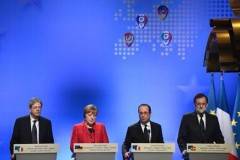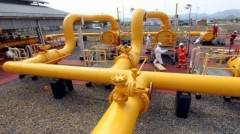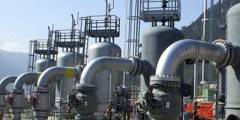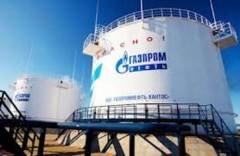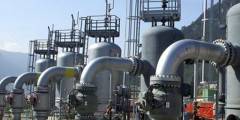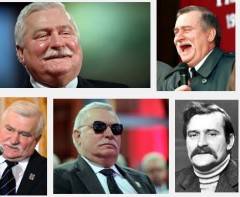Southstream -a shameful project that many in Europe supported due to pressure of powerful pro-Russian lobbies in countries such as Germany, France and Italy- was conceived by Putin to boost the energy dependence of the European Union on Russia and to endanger energy security of EU member states by so doing.
The withdrawal of Putin from Southstream is an important political victory of the Trans Atlantic Community and the European Union, which finally succeeded to play an assertive role in energy geopolitics.
This shows how assertive and strong the European Union can act whether it is unite. It also demonstrates that the Trans Atlantic Community needs now a further integration with the ratification of Treaty of Trans Atlantic Trade and Industrial Partnership -TTIP- and the liberalization of shale gas export from the United States to Europe.
Yours, Matteo Cazzulani
------------------------------------
Putin halts Southstream: a victory of Trans Atlantic Community
Philadelphia - The withdrawal of Russian President Vladimir Putin from the realization of Southstream pipeline is a political victory of the whole Trans Atlantic Community and a clear loss of Russian "aggressive" energy policy towards the European Union at the same time.
On Monday, December 1, Russian President Vladimir Putin stated that the realization of Southstream pipeline has been definitively halted because of the opposition of the European Union and several member states of the EU that finally came to oppose Southstream such as Bulgaria.
During a press conference with Turkish President Tajip Erdogan, in Ankara, Putin de facto admitted that the European Union succeeded to avoid the realization of a pipeline that endangers EU energy security.
Southstream was planed in 2009 by Putin and then-PM of Italy Silvio Berlusconi to pump 63 bcm of Russian gas per year from Russia to Austria through the Black Sea seabed, Bulgaria, Serbia, Hungary, Slovenia and Italy.
If realized, Southstream would have raised the export of Russian gas to Europe and would have certainly boosted the dependence of member states of the European Union to Russian energy resources.
After the European Commission passed the Third Energy Package -a legislation that prevents a joint control of both pipelines and natural gas commercialization within the European energy market by a non-European energy company, such as Russian national major Gazprom- Putin signed bilateral agreements for the realization of Southstream with several Russian-friendly member states of the EU.
However, the European Commission questioned the validity of these agreements, and eventually criticized Bulgaria, Hungary, Slovenia and Austria for endangering energy security of the whole European Union.
Although his decision not to build Southstream, President Putin won't give up from his plan to increase export of Russian natural gas to Europe. According to the head of Gazprom Alexei Miller, Russia has already agreed with Turkish energy company Botas on the realization of a new version of Southstream to carry Russian gas from Russia to Greece and Italy though Turkey.
The energy withdrawal of Putin from Europe shows how assertive and politically influent a United Europe could really be. However, the European Union should now take urgent measures to strengthen EU energy security before Putin will eventually quickly realize a new pipeline from Russia via Turkey.
On the one hand, the European Union must implement the diversification of gas supplies by realizing new pipelines and LNG terminals in order to import natural gas from new exporters, such as Azerbaijan, Qatar, Norway and Israel.
The European Union already launched and financed the realization important of LNG terminals in Croatia, Poland and Lithuania. The EU also endorsed, both politically and economically, the realization of Trans Adriatic Pipeline -TAP- conceived to pump 10 bcm of Azerbaijani natural gas from Greece to Italy through Albania.
On the other hand, the European Union must persuade the United States to start exporting US shale gas to Europe, in order to depend on a new source of energy that would definitively drop the dependence of Europe on Russia.
On this issue, the European Union can bet on the determination of the new President of the Council of the European Union Donald Tusk, who pledged the President of the United States, Barack Obama, to push for a quick ratification of the Treaty of Trans Atlantic Trade and Industrial Partnership -TTIP- during the first phone call Tusk made after he took office on December 1.
By the launch of a free trade area between the European Union and the United States, which is an important part of TTIP, the United States can be allowed to export shale liquefied gas to member states of the European Union. According to current legislation, the United States is allowed to export energy resources just to countries which already have a free trade agreement with the United States.
Another way to allow the export of shale gas from the United States to the European Union is an ad hoc decision that both US State and Energy Departments should take, on which political fields in the United States are still debating.
On the one hand, centrist democrats and moderate republicans second the export of US shale gas as a means to strengthen the role of the United States in the world as a new energy power which eventually helps its allies -such as South Korea, Japan, Singapore and the European Union- to diversify their energy supplies.
On the other hand, liberal democrats and far-conservative republicans argue the opportunity to utilize US shale gas bonanza to drop energy costs for US citizens in the United States internal market.
In the Congress, the republican majority promised to pass a legislation that will easy the export of US shale gas to member states of the European Union and other allies of the United States.
The democratic Presidential Administration of Barack Obama did not take year a clear position on the issue, although President Obama declared himself to be in favor of the export of US shale gas bonanza worldwide in order to relaunch US economy.
Matteo Cazzulani, Analyst of Trans Atlantic, Central Eastern Europe and energy issues, @MatteoCazzulani








